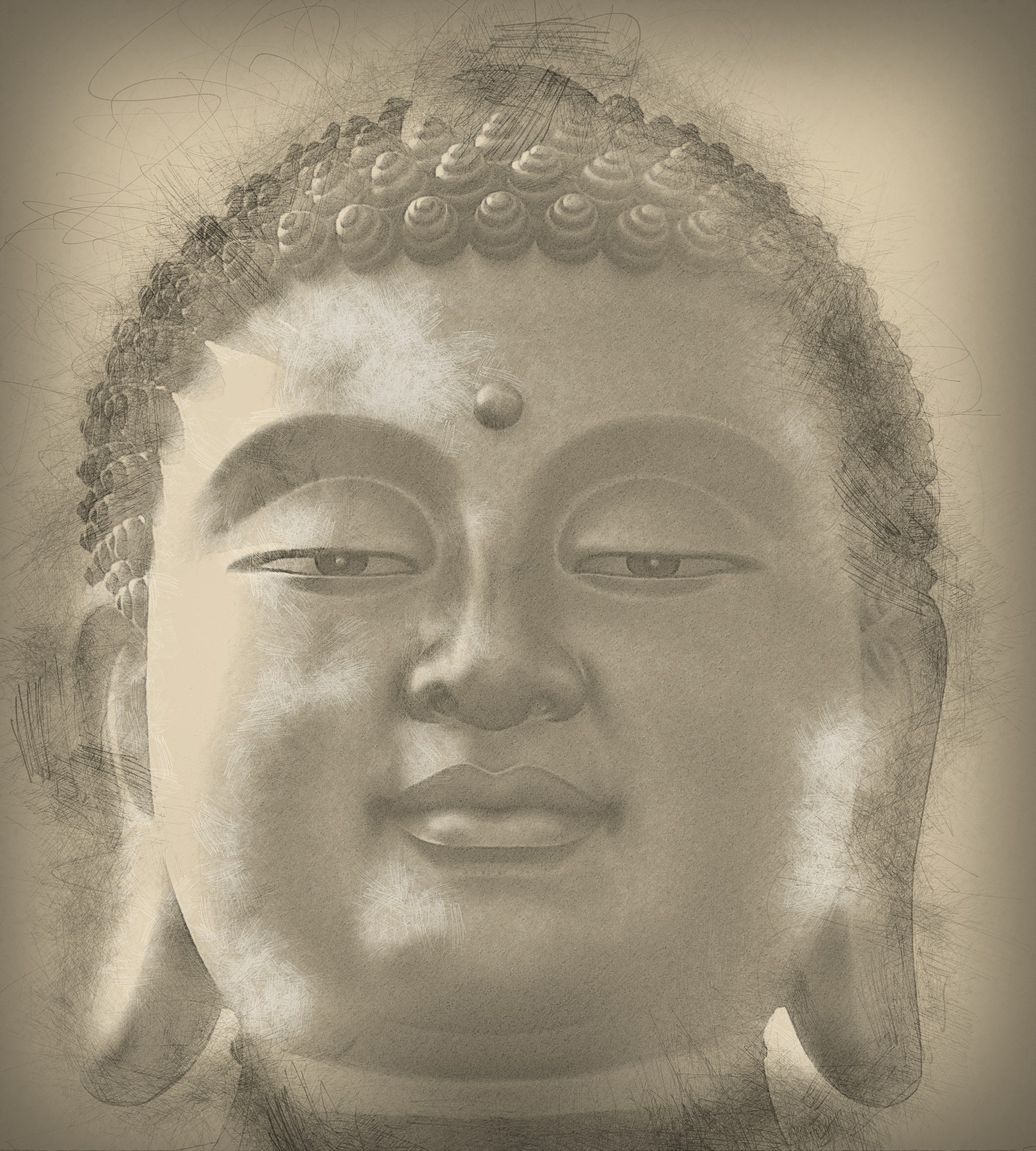 Submitted by Now What on
Submitted by Now What on

When a true yogi performs an action, karmically it is like writing on water. No mark remains. ~ Yogananda
The Buddha was sitting under a tree, giving a talk to an assembly of followers, when a stranger suddenly appeared, pushing through the congregation in a rage and heading straight for the sage. The Buddha’s disciples began to restrain him, but he ordered them to let the man go. They obliged, and the enraged figure marched forward, cursing, and spit in Buddha’s face.
The sage was unperturbed. He wiped it off, looking into the man’s eyes and and asking earnestly: “What next? What do you want to say next?”
The stranger’s face fixed into a puzzled expression. Who asks such a thing? Always, when he’d confronted people in the past, they’d reacted, either becoming enraged themselves or launching into a nervous appeal in order to avoid the fight they knew was coming. But this? The Buddha wasn’t angry, offended or cowardly. The plain matter-of-factness of “what next?” left him at a loss for words.
The Buddha’s disciples, however, became quite perturbed, demanding this interloper be punished, lest others derive the idea that such actions were an acceptable behavior.
“All of you keep silent,” Gautama said. “This man has not offended me, but you lot have. You’ve lived with me now for years, and still you react? This is a stranger; we’ve never met before. He must’ve heard something from others about me; that this man is an atheist, a danger to society, a revolutionary, a corrupter. Thus, he’s formed an idea about me, a notion, you see? He hasn’t spit on me at all, but instead on this notion that he’s carrying.”
At this his disciples fell silent. The rest of the onlookers shifted uneasily.
“If you think on it deeply,” the sage continued, “what’s happening here is that he’s actually spitting on his own mind. I am not a part of his mind — this is the first he’s ever heard me speak, so how could I be? Yet obviously he has something to say — something so powerful that he cannot keep it inside; something of such force that words simply will not do. Yes, there are such moments in life — moments of deep love, intense anger, hate, supplication — and we are witnessing one now. This is a moment that finds words impotent in their expression — only action will do, and it is only by our actions that decisions, and fates, are made.” He turned his eyes to the intruder once again. “This is why I ask: ‘what next?’“
The man tried to answer, but still no words would come. The crowd, however, began to murmur, and the disciples started arguing amongst themselves over what the Buddha had meant. Some of the onlookers had questions for the sage himself, and approached him with them, while others voiced their own opinions to one another, beginning to mill about. Slowly, the once-ordered assemblage descended into general disarray.
Yet the initiator — the man who had so boldly spit in Buddha’s face only a few moments ago — remained silent. He was unable to make sense of what had just happened. There wasn’t a hint of anger left in him, nor any other emotion he could identify. In fact, he felt indescribably devoid of everything, even thought. Not knowing what else to do, he slipped away quietly, leaving the milieu behind.
Sleep escaped him that night. He tossed under the sheets, sweating, unable to find comfort. The brief periods of slumber he did manage were feverish, haunted by images of the day’s events, the Buddha’s expressionless face shimmering beneath.
Nothing made sense anymore. What had happened? Where had his conviction gone? Yes, he’d heard of the terrible things the man known as Gautama Buddha was doing — the work of the devil, they said — and the stories he’d listened to, one after another, had finally boiled over and left him ready to bring the law down on this mutinous character. Unable to find support, however, he’d flown into a rage, storming onto the stage of the sage himself, ready to incite, ready to do whatever it took.
Instead, everything he thought he’d understood had been stripped away; his ideas, his emotions, even peripheral things from his past and all of his sureties about the future — all of them, disemboweled in mere moments. And it was true! There had been nothing in his mind but heresay. There had been nothing in his mind but his mind at all. Had he really been ready to fight — and possibly murder — a man he’d never met before, due solely to the squall that wailed so loudly in his own head?
He writhed under the sheets some more, wet and trembling. He clamped his eyes shut, trying again to sleep, but to no avail. Being in the Buddha’s presence had shaken him to the core.
The next morning, before the sun had barely risen above the horizon, he was back in the saint’s presence, this time throwing himself at his feet. Head down, hands trembling on the wise man’s toes, he again heard the words:
“What next?”
He looked up into the face that had haunted his dreams the entire night.
“This, too, is a way of saying something that cannot be expressed with language,” Gautama said, “When you come here and prostrate yourself such as this, you are once more expressing something for which words are too narrow; it cannot be contained in them.” He motioned to his disciples for their attention, pointing to the man who kneeled before him. “Again this stranger is here; again he speaks in a tongue too powerful for language. Look, my brothers, this man is a man of deep emotions.”
Now the stranger spoke for the first time: “Forgive me for what I did yesterday,” he implored, tears beginning to roll down his cheeks.
The Buddha laughed heartily. “Forgive?” he asked. “How? I am not the same man on whom the offence was committed. The Ganges goes on flowing; it is never the same Ganges again. Much has happened in these twenty-four hours! The river has flowed so much. So it is impossible to forgive you, you see, because no grudge exists to hold against you.”
The man who had spit in Buddha’s face only a day prior, and was now kneeling at his feet, began to laugh, unbelievingly, through his tears.
“And so too are you new,” the sage continued. “Obviously, you are not the same person who spit in Buddha’s face yesterday — that man was enraged.” He took the stranger’s hands and pulled him to his feet, using the leverage to bring himself to a standing position as well. Putting his arm across the weeping man’s shoulders, they began to walk. “Let us forget it,” he said. “Those two people are no more, but you and I? We are here. And though I know you are a man of few words, I would nonetheless be very interested to hear what you have to say.”
~~~~~~~~~~~
This tale, seemingly holding no part in any traditional buddhist teaching, nonetheless conveys an interesting message. While it has been criticized for possibly imparting the nihilistic idea of freedom from consequence, we decided to purvey it in a manner that hopefully implies a deeper meaning.
In the power of his non-reaction, the Buddha, whose karma is neutral, relieves much of the burdensome karma of his attacker, causing a profound and discomforting transformation in the man, who very well may have deepened his karma had a less-enlightened figure been the recipient of his fury. By drawing his attacker’s attention to the idea that he was no longer the angry man who spat, but a wholly different person in the aftermath, we are reminded of the breath-taking multiplicity of the ‘action-reaction tapestry’ that is shifting around us in every moment, and that we are all, therefore, continuously co-creating. Had the Buddha reacted differently, this tapestry would have become even more densely interwoven, with both men playing new parts indeed.
It has been said that those who have mastered themselves are imminently predictable in certain ways. While this tale is not meant to serve as an argument for pacifism (as all situations are subjective), what we hope it demonstrates is the stoic and simple resolve of one who, again, quite simply… knows what’s happening.
http://www.wisdompills.com/2014/10/19/man-spit-buddhas-face/
- 707 reads